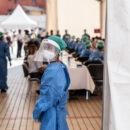Complex Emergencies

On page 115 of his recent book Complex Emergencies, David Keen writes, “For those familiar with this famine [1988 in southwest Kordofan and Bahr el Ghazal] the current crisis in Darfur is a horrific case of déja vu.”
Indeed there is little about the internal dynamics of the Darfur conflict that is substantially different from other complex emergencies in Sudan over the last 25 years and much that is similar from such crises elsewhere in the world. Over the next month, we will host a series of contributions and exchanges based on Complex Emergencies, aiming to develop the key themes of the book and also to relate them to Darfur.
Our first contribution is a review by Zoí« Marriage:
Complex Emergencies emanates from lectures renowned for their capacity to challenge MSc students (I was one of them) and encourage new ways of thinking. The book draws on David Keen’s research over three decades into the causes of wars and other forms of mass political violence and the responses that have been made to them. It brings together detailed investigations into the wars in Sudan, Sierra Leone and Iraq and complements them with other work to offer an authoritative account of contemporary politics and complex emergencies. The themes identified by the author provide a framework for analysis, mapping a massive intellectual scope through consideration of definitions and kinds of information alongside the discussion of war, peace, famine and aid. Much of Keen’s work is about questioning conventional wisdom, bringing fresh evidence, introducing alternative perspectives and incorporating a diversity of academic debates and disciplines.
There is already ample evidence and analysis of wars and the responses made to them and it is possible to turn the book in on itself by asking: what is its function, what purpose does it serve? Famines and conflicts in Sudan are perhaps the most analysed and explained of any of the complex emergencies that have taken place in Africa; and yet the emergencies continue, alongside conventional and un-critical forms of assistance. Why then, has Keen written another book much of which deals with Sudan? As he notes, people do not always change their minds when they receive new information: often bits that do not fit are ignored or accommodated through self-deception.
To my mind the answer lies in the fact that Complex Emergencies is about reading wars actively, by engaging intellectually with data and subjecting it to critical analysis. This is not a technical exercise: the spirit of Michel Foucault is always close to Keen’s writing, and – arguably with some generosity – Keen asserts that Foucault’s florid style is intentional, the aim being to remind the reader not to lay claim to scientific knowledge. The implication is that the knowledge behind the systems of violence explored in the book is constructed and so too is the critique. This approach makes the author intellectually vulnerable, but also allows him to accommodate analytical and moral analysis side by side. Violence is treated as the subject of analytical enquiry: Keen steers clear of condemning people – especially at the level of the individual. At the same time, Keen’s purpose has an ethical edge: his interpretation encourages the reader to employ moral judgement in assessing the outcomes of events and certain forms of behaviour.
According to Keen’s analysis, the systems of violence at play in complex emergencies are supported by discourses of power that reproduce and reinforce themselves with the forms of evidence that power produces. In identifying these systems of violence, Keen encourages the reader to investigate beyond the blast of the war in temporal, geographical and analytical terms. If the systems of violence have led not only (in one way) to violence in Darfur but also (in another way) to regressive responses from powerful countries, pressure to change the dynamic of violence must be applied not only at the level of implementation but also at the levels of conceptualization and analysis.
The argument of the book leads the reader to critique the systems of violence that sustain complex emergencies and their supporting science, and this includes critiquing one’s own place within them. Within our political institutions, how represented does one feel by the decisions on how to respond to the killing in Darfur or how to kill in Iraq? How much does one know not only about the situation in Darfur, but about what part any of our behaviour has on the situation there? This requires an interaction with the practicality of politics: of how change can be made not within the systems but to the systems of which we are part – as analysts, but also as constituents of democratic countries, private or public donors of aid organisations, economic elites, consumers of minerals and energy.
With regard to Darfur, the systems of violence demands that the reader – assuming a predominantly northern audience – is both humble (in that providing aid is not as straightforward as it might have seemed) and also responsible – in that the task for those in the global elite is more difficult and more urgent than simply one of implementing assistance. The emergency in Darfur may be maintained because factors that could ameliorate the situation are rendered impossible to perceive, let alone operationalize, by the “˜science’ and the politics that define it.
The analysis goes further. Keen touches on the inequality sustained by the systems as one of the factors that makes demobilization problematic in Sierra Leone; he refers, for example, to the swimming pools in expatriates’ compounds. In Darfur the prevarication and setbacks over AU and UN troop deployment are more about political pecking order and disputed legitimacy than about practicality or international law. The power of northern countries to intervene effectively is limited not only by their political blinkers but also by the combined historical weakness of UN missions and the aggression elsewhere of the USA and UK in particular.
The implications may be extended beyond the scope of the book to systems of structural violence, for example those described by the AIDS pandemic and environmental catastrophe. The management of AIDS and carbon emissions is dominated by northern interests and interpretations. Just as, in the discussion above, comparative wealth and political heavy-handedness proved counterproductive, maintaining inequality through mechanisms of management that prioritize particular agendas could cause a crisis of legitimacy. One may hypothesize, according to a systems of violence approach, that more violence will be employed in order to maintain the structure that has proved advantageous in the past. As different forms of violent crises occur, Complex Emergencies highlights the fact that they are invariably political in nature, but it does not suggest that all political mechanisms are of equal merit; in exercising judgment, we need to take the battle to ourselves.






David Keen has presented a book covering major characteristics of complex emergencies. His discussions of the complex emergency in Darfur are important, because this emergency comprises many of the characteristics seen in most other complex emergencies. The latest emergency in Darfur is also just another of many emergencies in Sudan, and therefore a sign of a lack of ability and will, both domestic and on the international arena, to provide political solutions to the problems in Sudan. This is also seen in many other complex emergency areas. A major question therefore is how the international community can deal with large-scale atrocities by governments in their own country, in emergencies where the government denies international military, humanitarian and political interventions.